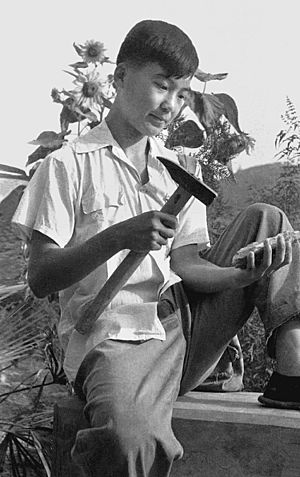Wen Jiabao facts for kids
Quick facts for kids
Wen Jiabao
|
|||||||||||||||||||||||
|---|---|---|---|---|---|---|---|---|---|---|---|---|---|---|---|---|---|---|---|---|---|---|---|
|
温家宝
|
|||||||||||||||||||||||
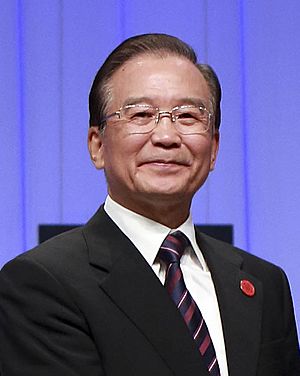
Wen in 2012
|
|||||||||||||||||||||||
| Premier of China | |||||||||||||||||||||||
| In office 16 March 2003 – 14 March 2013 |
|||||||||||||||||||||||
| President | Hu Jintao | ||||||||||||||||||||||
| Vice Premier |
Cabinet II (2008–13)
|
||||||||||||||||||||||
| Preceded by | Zhu Rongji | ||||||||||||||||||||||
| Succeeded by | Li Keqiang | ||||||||||||||||||||||
| Vice Premier of China | |||||||||||||||||||||||
| In office 18 March 1998 – 14 March 2003 |
|||||||||||||||||||||||
| Premier | Zhu Rongji | ||||||||||||||||||||||
| Preceded by | Li Lanqing | ||||||||||||||||||||||
| Succeeded by | Hui Liangyu | ||||||||||||||||||||||
| Director of the General Office of the Chinese Communist Party | |||||||||||||||||||||||
| In office April 1986 – March 1993 |
|||||||||||||||||||||||
| General Secretary | Hu Yaobang Zhao Ziyang Jiang Zemin |
||||||||||||||||||||||
| Preceded by | Wang Zhaoguo | ||||||||||||||||||||||
| Succeeded by | Zeng Qinghong | ||||||||||||||||||||||
| Personal details | |||||||||||||||||||||||
| Born | 15 September 1942 Tiensin, China |
||||||||||||||||||||||
| Political party | Chinese Communist Party (1965–Present) | ||||||||||||||||||||||
| Spouse | Zhang Peili | ||||||||||||||||||||||
| Children | 2 | ||||||||||||||||||||||
| Alma mater | China University of Geosciences (BS, MS) | ||||||||||||||||||||||
| Signature |  |
||||||||||||||||||||||
| Chinese name | |||||||||||||||||||||||
| Simplified Chinese | 温家宝 | ||||||||||||||||||||||
| Traditional Chinese | 溫家寶 | ||||||||||||||||||||||
|
|||||||||||||||||||||||
Wen Jiabao (Chinese: 温家宝; pinyin: Wēn Jiābǎo; born 15 September 1942) is a Chinese retired politician. He served as the 6th premier of China from 2003 to 2013. As the head of government, Wen was a key leader in China's economic plans. From 2002 to 2012, he was a member of the Politburo Standing Committee of the Chinese Communist Party. This group is China's top decision-making body. He was ranked third among its nine members.
Before becoming Premier, Wen was the director of the General Office of the Chinese Communist Party from 1986 to 1993. He also served as Vice Premier of China under Premier Zhu Rongji from 1998 to 2003. He oversaw important areas like agriculture and finance. Wen was often called "the people's premier" by media. He focused on helping farmers and migrant workers. His government reduced farm taxes and built new infrastructure. After the 2008 financial crisis, his government launched a huge economic support program. Wen retired from politics in 2013. Li Keqiang became the next Premier.
Contents
Early Life and Education
Wen Jiabao was born in the Beichen District of Tianjin, China. He attended Tianjin Nankai High School. This is the same school where Zhou Enlai, China's first premier, also studied.
From 1960 to 1965, Wen studied geological surveying at the Beijing Institute of Geology. This school is now called the China University of Geosciences. He continued his studies there, focusing on geological structures until 1968. Wen joined the Chinese Communist Party in April 1965 while he was a college student.
Early Career in Government
After finishing his studies, Wen began working in the geology bureau of Gansu province. From 1968 to 1978, he led a geological survey team there. He later became the chief of the Gansu Provincial Geological Bureau. He then rose to become Vice-minister of Geology and Mineral Resources.
In 1985, Hu Yaobang, who was then the General Secretary of the Chinese Communist Party, noticed Wen's talents. Wen then joined the Central Committee and Politburo. He served as Chief of the Party's General Affairs Office for eight years. This office manages the daily work of the party's leaders.
Wen was known as a skilled administrator. He was careful, capable, and focused on getting results. Premier Zhu Rongji trusted Wen greatly. From 1998, Wen was put in charge of agriculture, finance, and environmental policies as Vice-Premier. These areas were very important as China prepared to join the World Trade Organization.
Surviving Political Changes
Wen Jiabao was the personal secretary to Party General Secretary Zhao Ziyang. He was with Zhao when Zhao visited students protesting in Tiananmen Square in 1989. Zhao was later removed from his position. However, Wen was able to continue his political career. He is the only Chief of the Party's General Affairs Office to have worked under three General Secretaries: Hu Yaobang, Zhao Ziyang, and Jiang Zemin.
First Term as Premier (2003–2008)
In November 2002, Wen joined the Politburo Standing Committee of the Chinese Communist Party. This is China's highest ruling group. He was ranked third among its nine members. In March 2003, the National People's Congress confirmed his nomination as Premier. Over 99% of the delegates voted for him.
As Premier, Wen continued China's economic reforms. He shifted national goals from just economic growth to growth that also shared wealth more fairly. He also focused on social goals like public health and education. Wen's wide experience, especially in agriculture, helped him lead efforts to improve the rural economy. His government also started to focus on the environmental and health costs of economic development. This broader view of development was called the xiaokang society idea.
Wen was seen as a good communicator and was known as a "man of the people." He made efforts to connect with those in rural and western China who felt left behind by rapid economic growth. Many saw him and Hu Jintao as leaders who understood ordinary people. Wen was also known for his sharp memory. He once said, "The former Swiss ambassador to China once said that my brain is like a computer. Indeed, many statistics are stored in my brain."
Wen was involved in two major public health events. In early 2003, he helped end the government's slow response to the SARS crisis. In December 2004, he became the first top Chinese official to publicly address the problem of AIDS. He visited communities affected by AIDS, and these visits were shown on national media. This showed an effort to change years of denial and inaction.
Wen often visited poor areas of China's countryside without much warning. This helped him see the real situation, not just what officials wanted him to see. His government focused on the "Three Rural Issues": agriculture, the countryside, and farmers. In 2005, the Hu-Wen administration completely removed the old agricultural tax. This was a big change for the rural economy.
Wen was generally popular with the Chinese public. His sincere and warm manner led to comparisons with former Premier Zhou Enlai. He spent Chinese New Year in 2005 with coal miners. This helped him gain the image of being the "people's premier." Wen also held free press conferences for foreign media. He often answered tough questions about topics like Taiwan Independence and human rights.
In December 2003, Wen visited the United States for the first time. He also visited Canada and Australia, mainly for economic discussions. In April 2007, he visited Japan. He called the relationship between China and Japan one of "mutual benefit."
In March 2005, after the anti-secession law was passed, Wen stated, "We don't wish for foreign intervention, but we are not afraid of it." This was about the United States' stance on Taiwan. His comment received strong applause. In March 2007, Wen announced plans to increase China's military budget.
Second Term as Premier (2008–2013)
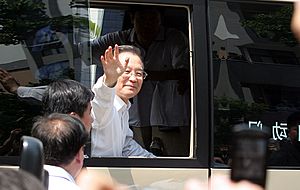
Wen Jiabao began his second five-year term as Premier on 16 March 2008. He worked to control rising inflation and prepare China for the 2008 Summer Olympics. He faced big economic challenges as the world dealt with the U.S. economic crisis. Keeping social stability in China's regions was also a key focus. In March 2008, Wen spoke about the 2008 Tibetan unrest. He blamed supporters of the Dalai Lama for the violence. He said Chinese security forces acted with restraint.
In November 2010, Wen became the first non-head of state to open the 2010 Asian Games opening ceremony in Guangzhou. In his final speech as Premier, Wen warned about the growing gap between rich and poor in China. He also spoke about the dangers of environmental degradation and unbalanced economic growth.
Response to the 2008 Sichuan Earthquake
Premier Wen Jiabao's popularity grew greatly after the 2008 Sichuan earthquake. He went to the disaster area just hours after it happened. He announced on national television that survivors would be rescued as long as there was "a glimmer of hope." He was immediately named the General Commander of the Earthquake Relief Efforts Committee. Images of Wen at the scene were widely shown on national media. Many people compared him to former Premier Zhou Enlai, another popular leader known as the "People's Premier." Wen's direct and caring approach gained him much support from Chinese citizens.
Foreign Policy
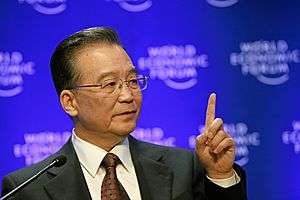
Wen Jiabao played a big role in China's foreign policy. He became more visible on the world stage as China's economy grew. He visited North Korea in October 2009. This was the first visit by a Chinese Premier since 1991. North Korean leader Kim Jong-Il greeted him at the airport, which was a rare honor. This showed North Korea's desire for a good relationship with China.
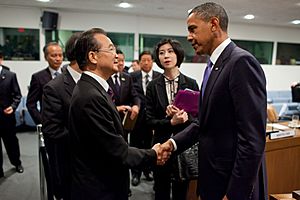
Wen also met with European Union leaders in November 2009. He refused calls for China to change the value of its currency, the Yuan. He said some countries were pressuring China while also using trade protectionism. Wen also attended the 2009 UN Climate Change Conference. He met with U.S. President Barack Obama to reach an agreement on emissions cuts.

Retirement
After the 18th Party Congress in November 2012, Wen stepped down from the Politburo Standing Committee. In March 2013, Wen retired from politics. Li Keqiang then became the new Premier of China.
Political Views
Media often described Wen as "populist" and connected to the needs of ordinary people. His policies focused on creating a harmonious society. This was based on the Scientific Development Concept, a key idea of his administration.
Wen spoke openly about democracy and more freedoms in interviews. He said that "democracy is one of the basic goals of the socialist system." In a 2008 interview, Wen said China's democratic system needed to improve. He believed power should "truly belong to the people" through an independent justice system. He also thought the government should accept criticism.
Wen was seen by some as a liberal voice among China's leaders. He often talked about political reform. In August 2010, he said, "Without political reform, China may lose what it has already achieved through economic restructuring." These comments were often censored in state media. However, he gained support from some party elders.
In a 2008 interview, Wen shared his political ideals: "To let everyone lead a happy life with dignity. To let everyone feel safe and secure. To let the society be one with equity and justice. And to let everyone have confidence in the future." He added, "I will not fall in spite of the strong wind and harsh rain, and I will not yield until the last day of my life." At the 2012 National People's Congress, Wen spoke about the need for reforms. He said China must "press ahead with both economic structural reforms and political structural reforms."
Personal Life
Wen Jiabao is married to Zhang Peili. She is an expert in jewelry and was involved in China's diamond trade. They have a son, Wen Yunsong, and a daughter, Wen Ruchun.
In October 2012, The New York Times published a report about Wen's family. It claimed they controlled significant financial assets during his time as Premier. A Chinese government spokesman said the report "blackens China's name and has ulterior motives." The websites of The New York Times were blocked in mainland China. Lawyers for Wen's family denied the report's claims. Wen himself reportedly asked for an investigation into the claims. He also expressed willingness to make his family's assets public.
Wen was known for using Chinese poetry in his speeches and when talking to journalists. He used it to share political and diplomatic messages.
See also
 In Spanish: Wen Jiabao para niños
In Spanish: Wen Jiabao para niños
- Politics of China
- History of the People's Republic of China (2002–present)
- Hu–Wen Administration
 | May Edward Chinn |
 | Rebecca Cole |
 | Alexa Canady |
 | Dorothy Lavinia Brown |


